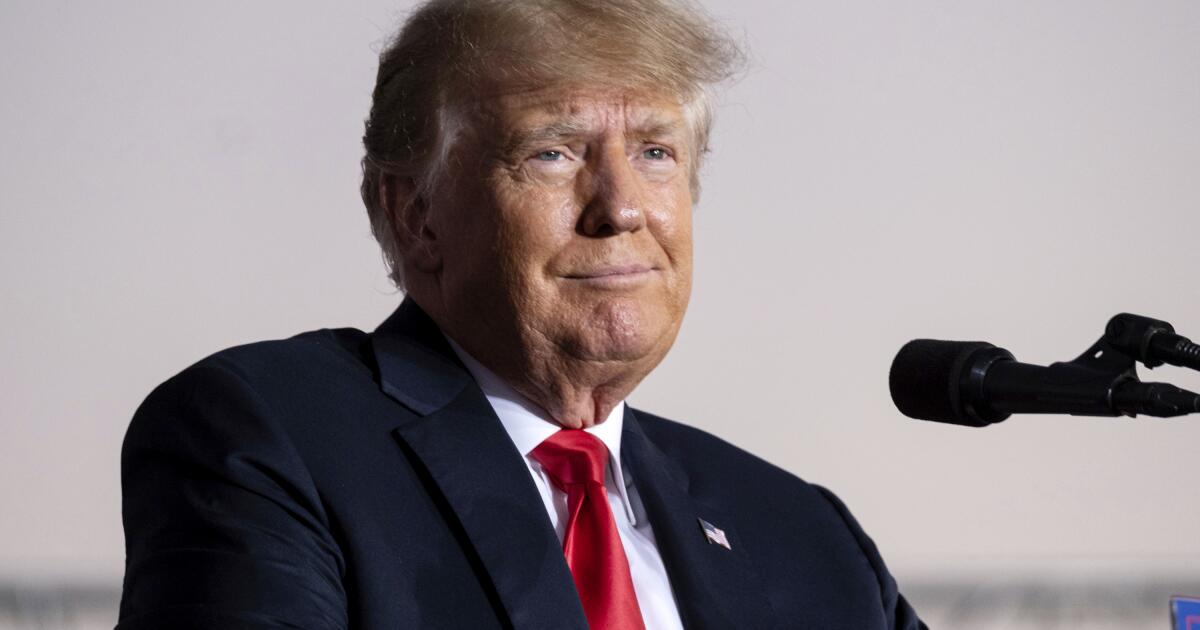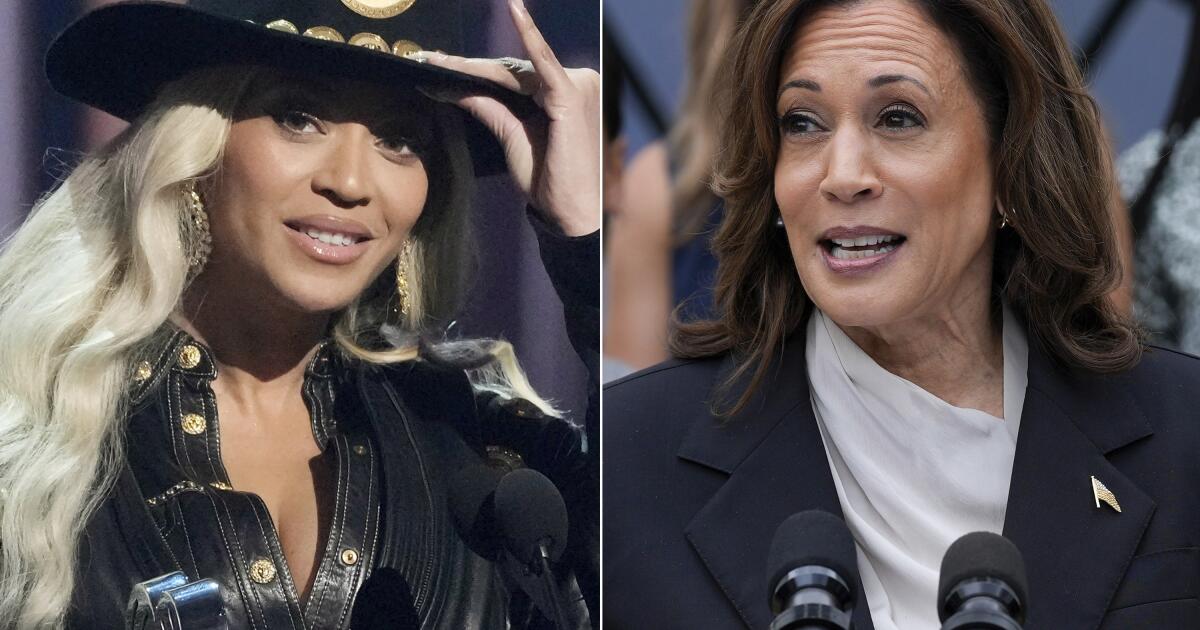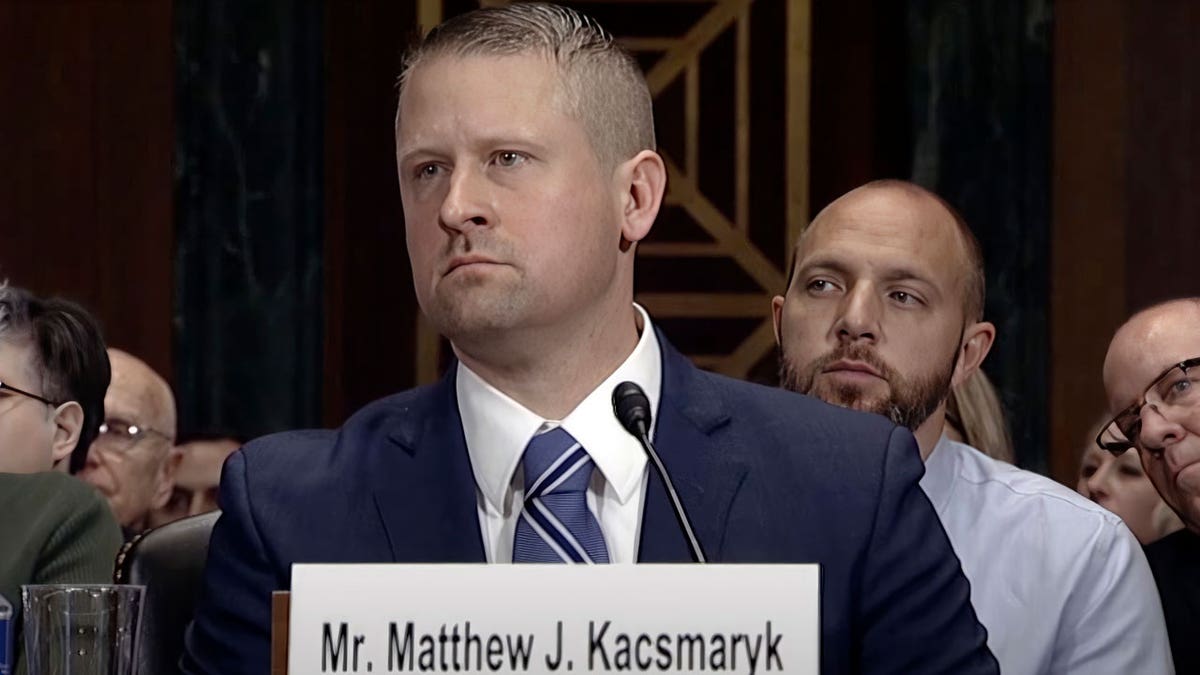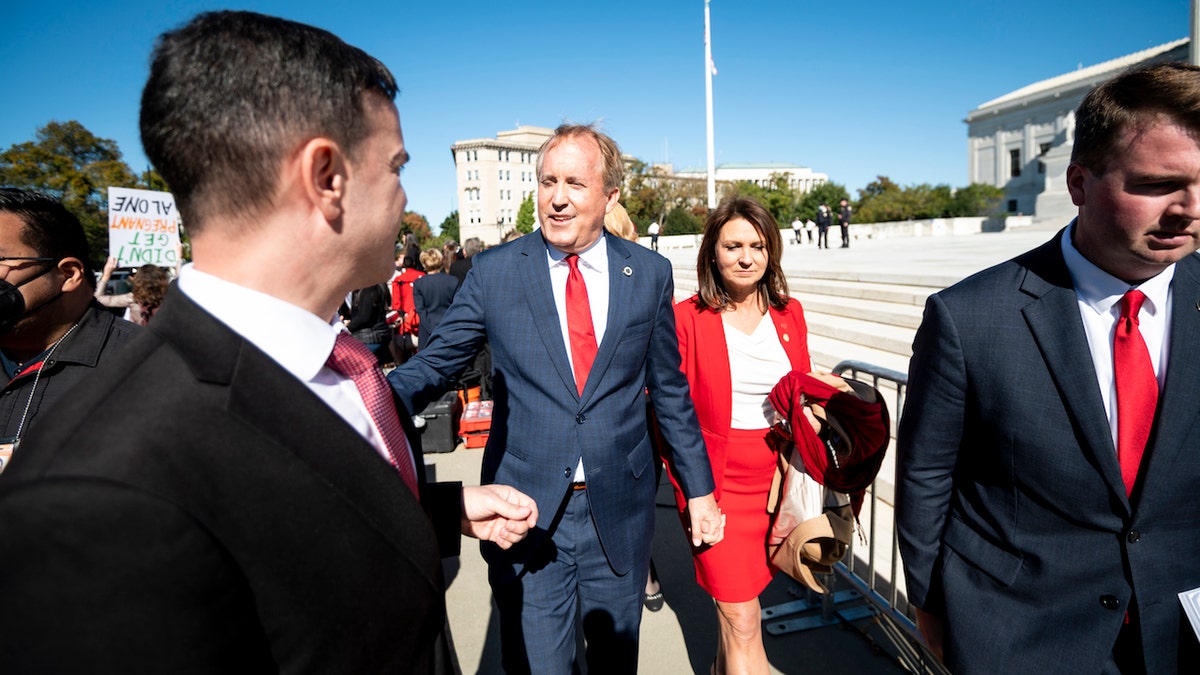Politics
Trump and GOP repeatedly echo Nazi and far-right ideology as they aim to retake White House

He’s dined with a white supremacist. He’s invoked theories espoused by Nazis in their quest for racial purity.
His response to white supremacists marching in Charlottesville? There were “very fine people on both sides. “
So this week, when a video on former President Trump’s Truth Social account made reference to a “unified Reich,” his opponents were primed to pounce.
The message of Trump’s post was muddled, according to historians, but it used language most often associated with Adolf Hitler’s Nazi regime.
Trump campaign spokesperson Karoline Leavitt said the video had been posted online without the former president’s approval by a junior staffer while Trump was in court. It went up while Trump was on his lunch break.
“This was not a campaign video, it was created by a random account online and reposted by a staffer who clearly did not see the word, while the President was in court,” Leavitt said in a statement to the Associated Press.
Still, Democrats and even some Republicans asserted that, whatever the intention or cause, the video showed that as Trump seeks to retake the White House, he often cites, invokes or is connected to far-right and Nazi language and imagery.
“If you understand fascism, you have a five-alarm bell going off in your head,” former Trump communications director Anthony Scaramucci said on MSNBC this week.
Scaramucci added that the people raising money for Trump’s campaign — mostly men, not women — “are doing it for superficial personal economic interest. They’re not understanding the full balance of what’s at stake here as it relates to the separation of power in the United States.”
Biden used the “unified Reich” video to repeat a theme he invokes frequently — the dire implications of a second Trump term.
“It is not the first time Trump has gone down this road,” Biden said at a fundraiser in Boston on Tuesday. “Folks, it can’t be any clearer. The threat Trump poses is greater the second time around than it was the first.”
In a video posted on social media Tuesday, Biden is seen watching the Truth Social post video reacting: “That’s Hitler’s language. That’s not America’s. He cares about holding on to power. I care about you.”
The video appeared on Trump’s social media Monday. The clip was ripped from another account and showed fake newspaper headlines saying “Trump Wins! and “What’s next for America?”
President Biden released his own video responding to the Trump “Reich” video.
(Alex Brandon / Associated Press)
But looking closer, the video, which appears to have been made with an online template, includes headlines such as “INDUSTRIAL STRENGTH SIGNIFICANTLY INCREASED… DRIVEN BY THE CREATION OF A UNIFIED REICH.”
The text that appears in the video come from a Wikipedia entry on World War I. The unified Reich idea most likely references history that precedes the foundation of the Third Reich, when Hitler came to power in 1933. Still, the term “Reich,” which in German means realm or empire, has become closely associated with Hitler and the massacring of Jews and other minorities.
Trump critics note the Reich reference joins a long string of comments and associations that echo Nazi ideology.
In December, Trump said in a speech that immigrants were “poisoning the blood of the country,” which echoed Hitler’s repeated invocations that Jews were “poisoning” Aryan Germans. Trump, at the time, said he was unaware of the parallel and that he’d never read Hitler’s seminal text “Mein Kampf.”
During the 2020 campaign he seemed to endorse in speeches “racehorse theory” — the idea that selective breeding can improve a country’s performance. This idea was foundational to the Nazi notion of racial purity.
He also called his political opponents “vermin,” a term frequently employed by the Nazis against their opponents. A recent tell-all from journalists Peter Baker and Susan Glasser describes how Trump complained that American military officials weren’t “totally loyal” to him and how he reportedly asked his then-chief of staff, retired Marine Corps Gen. John Kelly: “Why can’t you be like the German generals?”
Kelly pointed out that Hitler’s generals tried to assassinate him, according to Glasser and Baker.
“Nazism, imperialism, and dictatorship all fly in the face of democracy,” said George Mason professor Tehama Lopez Bunyasi who has studied how race and identity intersect with politics.
“The American people should beware any candidate who does not rebuke these three outright.”

White nationalist Nick Fuentes holds a rally in 2020.
(Nicole Hester / Ann Arbor News)
Gavriel D. Rosenfeld, president of the Center for Jewish History, said that Trump’s repeated flirtations with this sort of rhetoric and meetings with people like white nationalist Nick Fuentes condition people to look for the subtlest signs of antisemitism and parallels to Hitler. In 2022, Fuentes had dinner with Trump and rapper Kanye West, who now goes by Ye and who has repeatedly made antisemitic remarks in recent years.
Rosenfeld theorized that the Reich video could be “Gen Z staffers on the Trump team that like smuggling in ‘where’s Waldo’-style far-right icons into official Trump/GOP messaging” as hidden messages for their far-right peers.
It wouldn’t be the first time that happened. Last year, the presidential campaign of Florida Gov. Ron DeSantis fired a staffer who made a video of the governor that invoked Nazi ideology.
Then there are social media posts that come from people not directly connected to campaigns. During the 2020 presidential race, Facebook removed a pro-Trump post that included an upside-down red triangle, which was a symbol Nazis used to tar opponents. The New York Times reported that the anonymous social media user who purportedly made the video had posted several times that its meaning was clear and there was “not a secret hidden message.”
To Rosenfeld, such messaging has become all too common. “We’ve just been conditioned to see signs of fascism everywhere now,” Rosenfeld said, adding that there’s plenty of evidence in his mind that a second Trump term would be the “most right-wing and fanatical and corrupt in our lifetime.”
Thomas Weber, an expert on German history, pointed out that in modern Germany one far-right party has been cribbing wholesale from parts of the Nazi party manifesto.
“The whole bit about blood of the people: That is Nazi language pure and simple,” said Weber, a professor of history and international affairs at the University of Aberdeen in Scotland. The Reich video, however, is “more complicated,” he said.
The video imagines that in a second Trump term, there would be low taxes, “no more wars” and the “economy booms.” These themes, Weber said, “don’t resonate with either the message of the Third Reich, nor of Imperial Germany.”
The video says that in a second Trump term, the border would be closed. That’s not a uniquely Nazi idea or Trump view, Weber said, and neither is pushing for the wholesale removal of people deemed not to belong in a country.
Ideas expressed in Hitler’s Germany are appearing, one way or another, in many countries.
“It’s not uniquely Trump who is inadvertently copying Nazi policy, but the same is true for the parties and political leaders across the Western world,” Weber said. “They do not appear to be clear how much they’re ultimately echoing the party platform of the Nazi party.”

Politics
Park Police union says officers ‘did everything they could’ during DC anti-Israel riot

Following the protests at Union Station by anti-Israel agitators defacing federal property in protest of Israeli Prime Minister Benjamin Netanyahu’s address to Congress, a Park Police union is pushing back against criticism that only a few arrests were made.
Thousands of Hamas-sympathizing agitators descended on Washington, D.C., Tuesday, at one point defacing federal monuments with phrases in support of the terrorist group responsible for the Oct. 7 attacks in Israel, saying, “Hamas is coming.”
Twenty-three people were arrested at the protests, but some have suggested that number should have been higher.
Sen. Marco Rubio, R-Fla., posted on X, “How many more times are they going to allow leftist degenerates who support terrorism and hate America to vandalize property and attack police? There should have been hundreds of arrests today in D.C. not just 23.”
HOUSE REPUBLICANS REPLACE AMERICAN FLAGS AT UNION STATION AFTER ANTI-ISRAEL PROTESTS
The Columbus Memorial Fountain at Union Station during an anti-Israel protest on the day Israeli Prime Minister Benjamin Netanyahu addressed a joint meeting of Congress on Capitol Hill in Washington July 24, 2024. (Reuters/Seth Herald)
But the U.S. Park Police Labor Committee is pushing back.
“Our officers on the ground did everything they could to protect life and property. In fact, despite having only 29 officers available to mitigate damage — 29! — with no additional help from the Department of the Interior, we processed several arrests for charges ranging from assault on a police officer to destruction of government property,” Kenneth Spencer, chairman of the United States Park Police Fraternal Order of Police, said in a statement.
“That’s why it’s so disheartening to hear some members of Congress and members of the media, many of whom describe themselves as ‘champions’ of law enforcement, suggesting that officers gave protesters a ‘pass’ or that insufficient arrests were made.
“Nothing could be further from the truth. Anyone who truly cares to understand the problem would see that our officer staffing crisis is at the root of our agency’s mission readiness. A small unit of 29 officers arrested 10 individuals while being assaulted by a mob of thousands. We simply did not have the staffing or resources to accomplish a mass arrest operation.”
SEE IT: THE MOST DRAMATIC PHOTOS FROM WEDNESDAY’S PRO-HAMAS WASHINGTON, D.C. PROTESTS

An anti-Israel demonstrator sprays graffiti on the Christopher Columbus Memorial Fountain at Union Station on the day of Israeli Prime Minister Benjamin Netanyahu’s address to a joint meeting of Congress on Capitol Hill in Washington July 24, 2024. (Reuters/Nathan Howard)
At least one demonstrator, whose face was covered, was spotted by Fox News carrying what appeared to be the flag of the terrorist group Hamas while others were heard shouting “Allahu Akbar.”
KAMALA HARRIS REACTS TO ANTI-ISRAEL RIOTS AT DC’S UNION STATION

Anti-Israel demonstrators burn an effigy depicting Israeli Prime Minister Benjamin Netanyahu outside Union Station on the day of Netanyahu’s address to a joint meeting of Congress on Capitol Hill in Washington July 24, 2024. (Reuters/Nathan Howard)
The White House condemned the protests Wednesday evening, calling the chaos “disgraceful.”
“Identifying with evil terrorist organizations like Hamas, burning the American flag or forcibly removing the American flag and replacing it with another is disgraceful,” White House spokesperson Andrew Bates said in a comment to Fox News Digital Wednesday evening.
Politics
Ali: Kamala Harris has a campaign soundtrack: Beyoncé's 'Freedom'

Vice President Kamala Harris’ bid for the presidency has a soundtrack: Beyoncé’s “Freedom.”
The leading Democratic presidential candidate took the stage in her first visit to her Wilmington, Del. campaign headquarters and again during her first campaign rally in Wisconsin as the song played.
Now the cathartic anthem graces Harris’ first campaign ad, in which she says: “There are some people who think that we should be a country of chaos, of fear, of hate. But us? We choose something different: We choose freedom.”
Pit that against the musical number her competitor chose for his grand entrance on Night 3 of the Republican National Conference. Donald Trump walked out to James Brown’s “It’s a Man’s, Man’s, Man’s World,” a tone-deaf choice for a former president found liable for sexual abuse, who’s bragged about sexually assaulting women, a married man who paid hush money to a porn star and a former president who rolled back women’s reproductive rights 50 years with the repeal of Roe vs. Wade.
Maybe the Godfather of Soul would have endorsed Trump’s usage of his song, but Brown would be breaking with decades’ worth of musicians who’ve decried GOP candidates playing their tracks at rallies and booster events. Adele, Rihanna, R.E.M., the Rolling Stones, Prince, Neil Young, Guns N’ Roses and Queen are among the many artists who’ve spoken out against Trump using their tunes for campaign purposes.
Heart bristled when the McCain-Palin campaign used “Barracuda.” Tom Petty insisted George W. Bush back away from “I Won’t Back Down.” Bruce Springsteen decried Ronald Reagan’s appropriation of “Born in the U.S.A.”
Beyoncé, however, gave Harris her blessing to use “Freedom,” a single from her 2016 blockbuster album “Lemonade.” The song, which features guest rapper Kendrick Lamar, is an explosive expression of empowerment. At the time of its release, it spoke to public outcry around police killings of unarmed Black men and women — Eric Garner, Tamar Rice, Freddie Gray — and protests that were largely fueled by the ire of younger generations.
Whether Beyoncé was singing about the tyranny of a cheating spouse or racial injustice (or both), the song became an anthem for a new, potentially potent block of the American electorate.
For the first time, Gen Z and millennials could now account for as many votes as baby boomers and their elders, groups that have made up a majority of the electorate for decades.
Folks under 40 have grown up with Beyoncé and her ubiquitous work. Think of Beyoncé like the Who for boomers — their work is everywhere (Republican Sen. Rand Paul played the band’s anti-war hit “Baba O’Riley” when he campaigned in 2015) — or Nirvana for Gen X, except no one cares what we think. Whatever, nevermind.
The Harris campaign’s smart choice of music coincides with a willingness to lean into a meme culture that shot up organically around the 59-year-old VP since President Biden announced Sunday that he was dropping out of the race.
Pop star Charli XCX showed her support for Harris when she tweeted “Kamala IS brat.” The British singer is referring to the TikTok and Twitter edits of Harris’ image superimposed to songs from Charli XCX’s hit album “Brat.” The avalanche of memes come from a video clip in which Harris talks about her mother’s response to the hubris of youth: “You think you just fell out of a coconut tree? You exist in the context of all in which you live and what came before you.”
Right-wing social media used the quote to deride Harris as inarticulate and a “word salad” master, but liberal swaths of Gen Z have since reworked the clip into emojis and memes that celebrate Harris’ nonconformist approach. She’s become a viral sensation, in a good way, unlike J.D. Vance’s damning “single cat lady” memes and a cringey internet joke about encounters with couches.
It’s rare that relevant talent will shill for a Republican candidate. Case in point: Trump’s pop culture ambassadors at this year’s RNC were Kid Rock, Kanye’s ex Amber Rose and former WWE wrestler Hulk Hogan, whose big moment was ripping his shirt off and screaming “Let Trump mania run wild!”
Harris chose to let freedom ring, and she has Queen Bey behind her.
Politics
Texas sues Biden administration over program giving birth control to teens without parents' knowledge

Texas officials are challenging a recent order from President Biden’s administration that would allow schools to distribute birth control to teenagers without parental consent.
Texas Attorney General Ken Paxton announced Thursday that his office is suing the Biden administration over their 2021 change to Title X guidelines banning parental consent requirements for birth control services.
“By attempting to force Texas healthcare providers to offer contraceptives to children without parental consent, the Biden Administration continues to prove they will do anything to implement their extremist agenda — even undermine the Constitution and violate the law,” Paxton said in a statement.
TRUMP SAYS HE ‘WILL NEVER ADVOCATE IMPOSING RESTRICTIONS ON BIRTH CONTROL’ OR OTHER CONTRACEPTIVES
A woman takes the next pill from a monthly pack of contraceptive pills. (Annette Riedl/picture alliance via Getty Images)
The Texas legal battle began in Dec. 2021 when US District Judge Matthew Kacsmaryk ruled that Title X — the federal program that provides free, confidential contraception to anyone regardless of age, income or immigration status — violates parental rights and violates state and federal laws.
The case was argued by former solicitor general of Texas Jonathan Mitchell, representing father Alex Deanda, who said he was “raising each of his daughters in accordance with Christian teaching on matters of sexuality, which requires unmarried children to practice abstinence and refrain from sexual intercourse until marriage.”
SCHUMER PLANS VOTE ON ‘CONSTITUTIONAL RIGHT TO CONTRACEPTION’ IN BID TO PROTECT SENATE DEMOCRAT MAJORITY

Kacsmaryk, a Trump appointee, previously ruled that parents must be informed when birth control is provided to their children under 18 years old. (Senate Judiciary Committee via AP)
In response, the federal government updated guidelines to state that Title X projects “may not require consent of parents or guardians for the provision of services to minors, nor can any Title X project staff notify a parent or guardian before or after a minor has requested and/or received Title X family planning services.”
Paxton is now seeking a permanent injunction on this rule, which he claims defies the findings of the federal court.

Paxton and his wife Angela are pictured outside the Supreme Court. (Bill Clark/CQ-Roll Call, Inc via Getty Images)
Paxton filed the lawsuit in a federal court in Amarillo. It will likely be heard by Kacsmaryk, the same judge who previously ruled parents must be informed of birth control provided to their children.
-

 World1 week ago
World1 week agoOne dead after car crashes into restaurant in Paris
-

 Midwest1 week ago
Midwest1 week agoMichigan rep posts video response to Stephen Colbert's joke about his RNC speech: 'Touché'
-

 News1 week ago
News1 week agoVideo: Young Republicans on Why Their Party Isn’t Reaching Gen Z (And What They Can Do About It)
-

 Movie Reviews1 week ago
Movie Reviews1 week agoMovie Review: A new generation drives into the storm in rousing ‘Twisters’
-

 News1 week ago
News1 week agoIn Milwaukee, Black Voters Struggle to Find a Home With Either Party
-

 Politics1 week ago
Politics1 week agoFox News Politics: The Call is Coming from Inside the House
-

 News1 week ago
News1 week agoVideo: J.D. Vance Accepts Vice-Presidential Nomination
-

 World1 week ago
World1 week agoTrump to take RNC stage for first speech since assassination attempt













